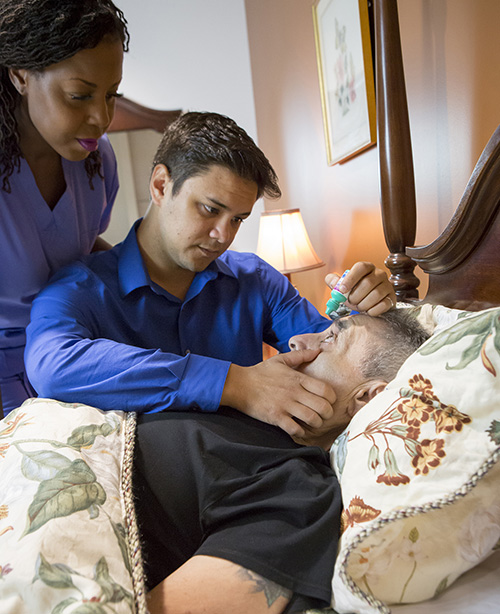Interprofessional family caregiving competencies and family caregiver domains of preparedness
Read the latest published research on competencies in the Gerontology & Geriatrics Education Journal.

Health professionals work with patients and families every day. Experts at the Family Caregiving Institute at the Betty Irene Moore School of Nursing lead efforts to make those encounters successful.
Success requires health professionals to have certain competencies. With the knowledge, skills and abilities they can best support caregivers and assess caregivers’ readiness to assume the role.
This undertaking directly responds to the California Task Force on Family Caregiving. The 2018 report recommends that caregivers have easily accessible information, education, and training that reflects their culture and unique situation. It also recommends that family caregivers be integrated into hospital processes.
“This shifts the current way providers interact with caregivers. Our work in education will reframe the way we think about the role family caregivers play, giving voice to people who have been Invisible in the health care system for a long time,” explains Kathryn Sexson, the associate director of education for the institute.
Researchers study the bigger picture of what caregivers need to know and what resources they need for their caregiving roles. The work also considers health care providers’ perspectives, including how to integrate caregivers throughout the experience between hospital and home or community settings.
“Ultimately, our goal is to reduce the burden for family caregivers. We can impact more of them by educating health care professionals than we could ever do working one-on-one with caregivers,” Sexson said. “The knowledge of health care leaders, researchers and clinicians will then inform those agencies that are working individually with families day in and day out.”
After gathering and refining input from the literature and experts in family caregiving, the institute team identified four competencies for health care professionals:
- Nature of family caregiving
- Family caregiving identification and assessment
- Provision of family-centered care
- Context of family caregiving
They identified nine domains in which to assess the preparedness of family caregivers:
- Household tasks
- Personal care
- Mobility
- Health monitoring
- Emotional and social support
- Care coordination
- Nursing and medical tasks
- Shared decision making
- Caregiver self-care
This work then led to the development of learning modules. Providers and formal caregivers can earn certification in caregiving through programs such as:
-
Family Caregiving Certificate Program: Key concepts in family caregiving for health care professionals. The initial modules focus on learning and teaching complex nursing tasks with a focus on caregiver assessment, the nuances of teaching older adults or individuals in high-stress situations and shared decision making.
-
Achieving Care Excellence – Caregiving (ACE-C) Simulation Modules: The interprofessional family caregiving competencies and family caregiver domains of preparedness guide module development. The John A. Hartford Foundation, AARP, National League for Nursing (NLN) and UC Davis partner together on this project where institute educators serve as subject matter experts.
Read the Family Caregivers Domains of Preparedness (PDF) »
Read the Interprofessional Family Caregiving Competencies (PDF) »

